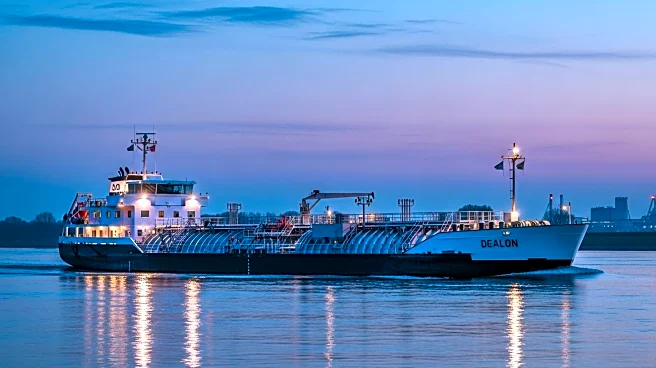What's Happening?
HGK Shipping has launched its third gas tanker, 'GAS 96', optimized for shallow water operations with a diesel-electric drive system. The vessel, named in Rotterdam, will operate on the Rhine routes, transporting liquefied gases for LyondellBasell under a long-term charter agreement. The 'GAS 96' features four tanks with a total cargo volume of 3,256 cubic meters and is designed to maneuver safely in extreme water conditions. The vessel's construction involved collaboration between Romania and the Netherlands, setting new standards for inland waterway shipping.
Why It's Important?
The introduction of 'GAS 96' represents a significant advancement in inland waterway shipping, emphasizing efficiency and sustainability. The vessel's design allows for reliable operations even in challenging weather conditions, ensuring consistent supply chains for the chemical industry. This development highlights the growing importance of innovative shipping solutions in Europe, potentially influencing future designs and operational strategies in the sector. The focus on sustainability aligns with broader environmental goals, promoting cleaner and more efficient transport methods.
What's Next?
HGK Shipping's deployment of 'GAS 96' may encourage other companies to adopt similar technologies, driving innovation in the inland shipping industry. The vessel's performance on the Rhine routes will be closely monitored, potentially influencing future investments in diesel-electric systems and shallow water optimization. The long-term charter agreement with LyondellBasell suggests continued collaboration between shipping and chemical industries, fostering partnerships that prioritize efficiency and sustainability.
Beyond the Headlines
The launch of 'GAS 96' reflects broader trends in the shipping industry towards sustainable practices and technological innovation. As environmental concerns grow, companies are increasingly investing in future-fuel-ready systems to reduce their carbon footprint. This shift may lead to regulatory changes and incentives for adopting cleaner technologies, impacting the industry's long-term development and competitiveness.










